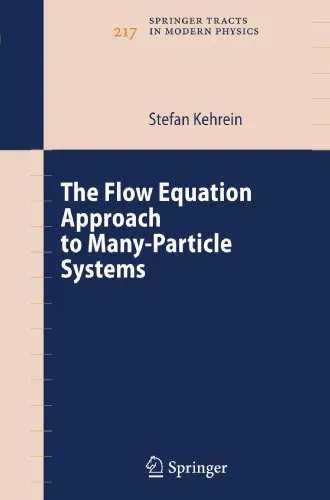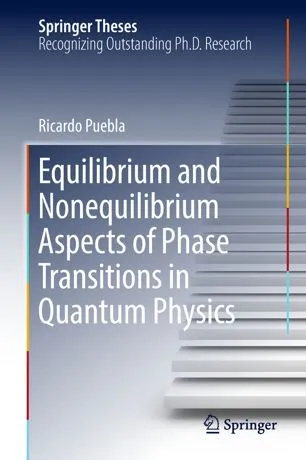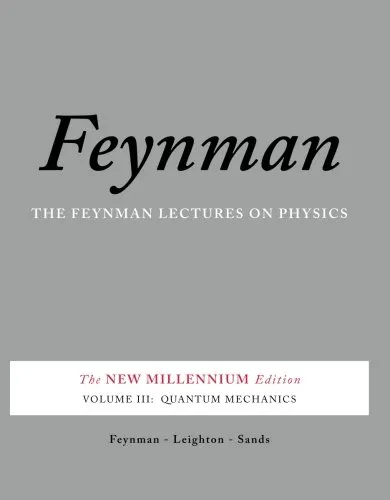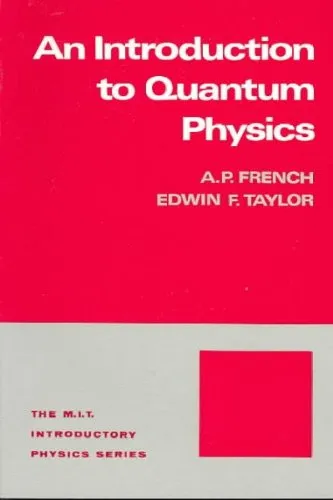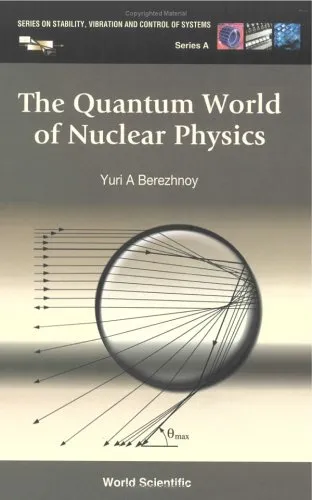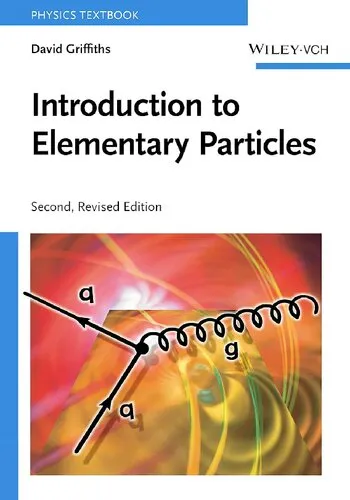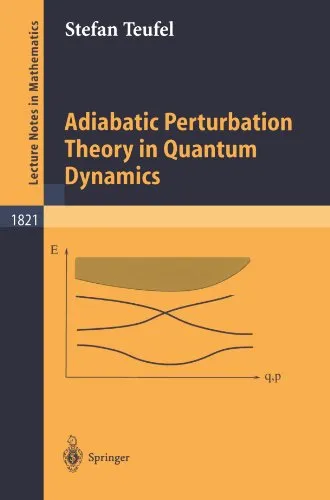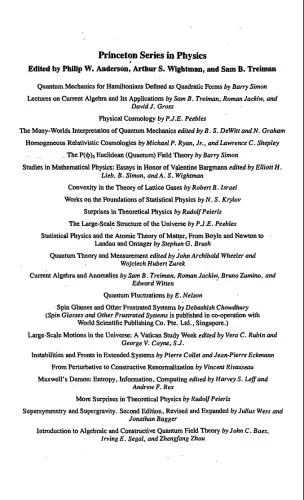The Flow Equation Approach to Many-Particle Systems (Springer Tracts in Modern Physics, 217)
4.3
بر اساس نظر کاربران

شما میتونید سوالاتتون در باره کتاب رو از هوش مصنوعیش بعد از ورود بپرسید
هر دانلود یا پرسش از هوش مصنوعی 2 امتیاز لازم دارد، برای بدست آوردن امتیاز رایگان، به صفحه ی راهنمای امتیازات سر بزنید و یک سری کار ارزشمند انجام بدینکتاب های مرتبط:
معرفی کتاب
کتاب The Flow Equation Approach to Many-Particle Systems یکی از منابع مهم و تأثیرگذار در زمینه فیزیک سیستمهای چند ذرهای است. این کتاب که توسط استیفن کهرین نوشته شده، به بررسی روش معادلات جریان برای مطالعه سیستمهای پیچیده شامل تعداد زیادی ذره میپردازد. روش معادلات جریان یک ابزار نظری قدرتمند است که طیف وسیعی از کاربردها، از سیستمهای کوانتومی تا مسائل جامدات، را پوشش میدهد.
خلاصهای جامع از کتاب
این کتاب در چند فصل به توضیح و تحلیل روش معادلات جریان میپردازد. ابتدا، مبانی نظری مورد نیاز برای درک این روش ارائه میشود. سپس، فصلهای بعدی به کاربردهای عملی و مثالهای متعددی در فیزیک سیستمهای چند ذرهای اختصاص یافتهاند. یکی از ویژگیهای متمایز این کتاب، توانایی آن در توضیح مسائل پیچیده به زبانی ساده و روان است، که آن را هم برای دانشجویان و هم برای پژوهشگران حرفهای مناسب کرده است.
نکات کلیدی
- توضیح دقیق و ساده از روش معادلات جریان و کاربردهای آن.
- بحثهای عمیق در مورد نقش و اهمیت flow equations در تحلیل سیستمهای کوانتومی.
- ارائه مثالهای روشن و کاربردی برای درک بهتر مفاهیم پیچیده.
نقل قولهای معروف از کتاب
"روش معادلات جریان، همانند تحولی در ابزارهای ریاضی است که ما را قادر میسازد تا سیستمهای معادلات چند ذرهای را با دقت بیشتر و بهینهتر تحلیل کنیم."
"فیزیک سیستمهای پیچیده، به کالبدشکافی معادلات آنها بستگی دارد، و معادلات جریان نقش جراحی ماهر را ایفا میکند."
چرا این کتاب مهم است
مطالعه سیستمهای چند ذرهای یکی از چالشهای مهم در فیزیک نظری است، و کتاب The Flow Equation Approach to Many-Particle Systems راهکارها و بینشهای جدیدی را ارائه میدهد که این چالشها را به فرصتهای تحقیقاتی نوآورانه تبدیل کرده است. این کتاب برای هر کسی که در حوزه فیزیک مواد جامد یا فیزیک کوانتومی فعالیت میکند، منبعی بیبدیل میباشد. فراگیری روش معادلات جریان به محققان کمک میکند تا درک بهتری از دینامیک سیستمهای پیچیده پیدا کنند و به توسعه روشهای جدید برای مطالعه مسائل پیچیده بپردازند.
Introduction to 'The Flow Equation Approach to Many-Particle Systems'
Welcome to "The Flow Equation Approach to Many-Particle Systems," a fascinating journey into a sophisticated framework for analyzing complex quantum systems. This book, Volume 217 in the Springer Tracts in Modern Physics series, delves deep into the theoretical underpinnings and practical applications of flow equations in many-particle systems. It addresses a crucial audience of graduate students, researchers, and professionals in theoretical physics and related fields, aiming to deepen their understanding of contemporary methods for investigating quantum phenomena.
Detailed Summary of the Book
The book is structured to provide a comprehensive exploration of flow equations—a transformative analytical tool in the study of many-particle systems. It begins with fundamental concepts, explaining the utility and importance of flow equations in simplifying complex quantum mechanical interactions. Moving beyond classical approaches, the book emphasizes the renormalization and decoupling techniques that make flow equations particularly useful in handling diverse and interacting many-particle systems.
As you progress through the chapters, you'll encounter a systematic development of the methods, supported by rigorous mathematical frameworks. The narrative emphasizes practical computation strategies, highlighting the ability of flow equations to transform challenging Hamiltonians into more tractable forms. Key applications are illustrated, including the treatment of quantum impurities, spin models, and low-dimensional systems. Each section is crafted to build on the previous, ensuring that readers develop a cohesive and thorough grasp of the topics.
By the end of the book, readers will have a nuanced understanding of both the theoretical structures and the practical implementations of flow equations, recognizing their power and versatility in modern physics research.
Key Takeaways
- Mastering Flow Equations: Understand the intricate process of applying flow equations to simplify many-particle interactions and solve complex systems.
- Theoretical Applications: Explore the mathematical rigor behind flow equations and see their application in a range of scenarios, from quantum impurities to spin models.
- Problem-Solving Techniques: Gain valuable problem-solving skills, learning to leverage flow equations for practical computations in physics.
- Contemporary Relevance: Realize the relevance of flow equations in ongoing theoretical research and their role in advancing our understanding of quantum systems.
Famous Quotes from the Book
"Flow equations not only illuminate the path to simplifying Hamiltonians but also unveil the profound richness hidden in the mathematical structures of quantum systems."
"The elegance of flow equations lies in their transformative capability—turning the abstract into the solvable, the complex into the comprehensible."
Why This Book Matters
"The Flow Equation Approach to Many-Particle Systems" is critical for anyone engaged in the cutting edge of theoretical physics. The unique approach of using flow equations to dissect and examine complex many-particle systems grants readers unparalleled insights into the inner workings of quantum interactions. This book is an invaluable resource for those seeking to broaden their analytical arsenal with a methodology that challenges and extends beyond conventional models.
Physics is a continually evolving field with a constant influx of new theories and discoveries. This text serves as a beacon for understanding advanced quantum theories, offering readers both the tools and the mindset necessary to push the boundaries of current knowledge. The emphasis on practical applications makes this book not just a guide, but a partner in discovery.
دانلود رایگان مستقیم
شما میتونید سوالاتتون در باره کتاب رو از هوش مصنوعیش بعد از ورود بپرسید
دسترسی به کتابها از طریق پلتفرمهای قانونی و کتابخانههای عمومی نه تنها از حقوق نویسندگان و ناشران حمایت میکند، بلکه به پایداری فرهنگ کتابخوانی نیز کمک میرساند. پیش از دانلود، لحظهای به بررسی این گزینهها فکر کنید.
این کتاب رو در پلتفرم های دیگه ببینید
WorldCat به شما کمک میکنه تا کتاب ها رو در کتابخانه های سراسر دنیا پیدا کنید
امتیازها، نظرات تخصصی و صحبت ها درباره کتاب را در Goodreads ببینید
کتابهای کمیاب یا دست دوم را در AbeBooks پیدا کنید و بخرید
1275
بازدید4.3
امتیاز0
نظر98%
رضایتنظرات:
4.3
بر اساس 0 نظر کاربران
Questions & Answers
Ask questions about this book or help others by answering
No questions yet. Be the first to ask!
